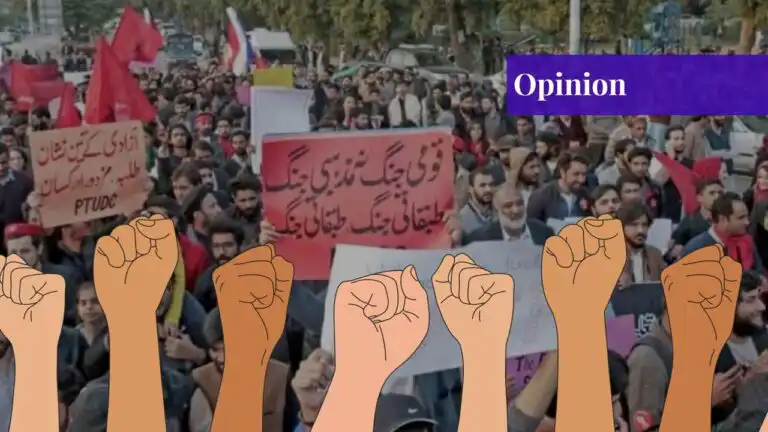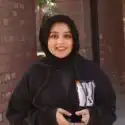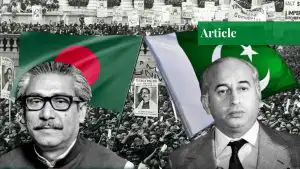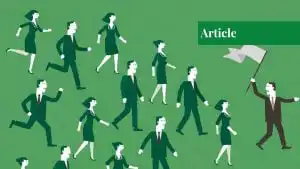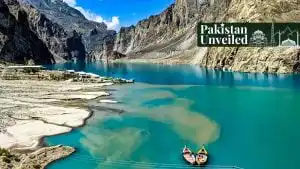Pakistan with a population of 64% under the age of 30, still contemplates whether student unions are a good or bad idea. The country saw its last student union elections in February of 1984, before being scrapped by martial law. These student unions also pan their branches into politics, becoming a major force in the country’s political landscape. Usually, under-appreciated, these student bodies play a crucial role in a country’s socio-political framework, by guiding public trends.
The political debacle that’s been taking place in Bangladesh has once again brought into discussion the role of these unions in Pakistan. The vibrance and activism these student unions bring into the evolution of society can be seen on the streets of Bangladesh. The protests that took a violent form at Dhaka University were not the first time students at Dhaka jolted a government. Be it the Language movement of 1950, the uprising against dictator Ayub Khan in 1969, or the 1970s Bangladesh Liberation War, the student union at Dhaka University made a profound impact by leading society to big changes.
In 1984, General Zia ul Haq banned student unions across the country. This was to suppress the democratic forces and ensure a smooth dictatorship, something that hasn’t been restored to date. With the first elections happening in 1971, East Pakistan followed the socio-political uprising and rebellion behind political leaders like Sheikh Mujib. Being a product of student politics himself, and having unions at his back, he led Bengal to partition. In the West, democracy was short-lived as martial law was imposed by General Zia. Following the dictatorial norms, the government banned all student unions, barring students and youth from taking part in any sort of political activity. These students were seen as resilient forces of democracy and freedom who were not afraid of jails and punishments. The unions were labeled “violent swarms”–the source of instability in the country and society. Any association with them was akin to joining malevolent forces.
Today, when Pakistan is on the verge of the biggest socio-political meltdown, so-called political leaders squabble for power and chairs. The diabolical irony of the situation is the utter disregard of the elites for what laymen are suffering through in this inflation and the fact that a country with the most youth-centric population lacks a single mainstream political party that brings young leaders into mainstream politics.
Who cares what a common man feels?
None of the Big 3s, PMLN, PPP, nor PTI have clean or fair democratic intra-party elections, let alone a process for hunting young leaders from the student unions. At most, these parties reinforced the dynastic politics in both the country and the party systems.
Of all, PTI failed to serve young leaders; a founding principle of the party. The political leaders Pakistan has produced in its history, especially in the recent past have failed to impress intellectuals with their political wisdom. Their distance from socio-cultural realities, political sensitivity, and lack of good judgment, is a testament to their lack of political training. If any, only two political parties– PPP and Jamat-e-Islami have actively worked on student unions. PPP gave in to the demands in Sindh because of their long-standing stance on student activism in politics. However, it was nothing more than a paper tiger.
On the other hand, Jamat-e-Islami has had the most active student unions. Their power shows in Karachi, training programs, and the foundation of “Jamat-e-Islami Talb,” ensure active engagement among students. Through these strategies, Jamat-e-Islami has kept its hold on student unions alive.
The establishment and governing parties blame the violent episodes of 1970 and 1990 for the ban. However, violence has long been used to keep students barred from political activism as this would reinforce a mainstream tyrannical monarchic rule in the country.
There is no doubt that the violent massacre that took place between left and right-wing student politics should not return. However, to ban student unions altogether is like cutting off one’s nose to spite one’s face. When student unions are scrapped, the guardrail of democracy is tossed out, and secessionist political trends are reinstated which disempowers the young generation and hampers a nation’s socio-political discourse.
The absence of student unions in Pakistan has limited the role of youth in the country’s politics. Youngsters from the middle class and lower class, who have the most stake in the country’s politics, have no path to lead them into mainstream politics. Moreover, without an understanding of the democratic process, politicization has rather created the “us vs. them” mentality. This polarization can only end when dialogue is encouraged and political debates are nurtured in public from a young age. Given the substandard situation of democracy and politics in the country, new youthful leaders are imperative.
As for Pakistan, if it fails to give its younger generation a mainstream channel to voice their political ideas, its future is imperiled. Hence, reinstating unions and student organizations is necessary to strengthen and train future leaders with political wisdom, and tolerance, making it a sin qua non situation for Pakistan.
If you want to submit your articles, research papers, and book reviews, please check the Submissions page.
The views and opinions expressed in this article/paper are the author’s own and do not necessarily reflect the editorial position of Paradigm Shift.
She is doing her Bachelor in International Relations from Kinnaird College for Women's University, Lahore. She has done multiple internships with prestigious institutes and has a keen interest in foreign policy and diplomacy.

